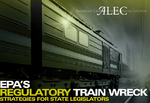Environment, Energy, and Agriculture: Difference between revisions
Adjusting styles for mobile friendliness |
m Changed PRW URLs from HTTP to HTTPS |
||
| (3 intermediate revisions by 2 users not shown) | |||
| Line 5: | Line 5: | ||
! style="padding:2px;" | <h2 style="margin:3px; background:#2966B8; font-size:140%; font-weight:bold; text-align:left; color:#FFFFFF; padding:0.2em 0.4em;">Rewriting the Rules about the Environment, Energy, and Agriculture</h2> | ! style="padding:2px;" | <h2 style="margin:3px; background:#2966B8; font-size:140%; font-weight:bold; text-align:left; color:#FFFFFF; padding:0.2em 0.4em;">Rewriting the Rules about the Environment, Energy, and Agriculture</h2> | ||
|- | |- | ||
| style="color:#000000; font-size:120%; padding:0.75em;" |[[File:Environment.jpg|125px|left|alt=Environment, Energy, and Agriculture]] '''This page shows how bills pushed by ALEC corporations work to undermine environmental protections, limit the ability of local government to manage land use, and protect corporate polluters.''' These "model bills" and resolutions thwart efforts to address climate change, streamline siting of nuclear power plants, and oppose efforts to address hazardous coal waste. | | style="color:#000000; font-size:120%; padding:0 0.75em;" |[[File:Environment.jpg|125px|left|alt=Environment, Energy, and Agriculture]] '''This page shows how bills pushed by ALEC corporations work to undermine environmental protections, limit the ability of local government to manage land use, and protect corporate polluters.''' These "model bills" and resolutions thwart efforts to address climate change, streamline siting of nuclear power plants, and oppose efforts to address hazardous coal waste. | ||
'''Through ALEC, corporations have both a VOICE and a VOTE on specific changes to state laws on these issues through these model bills. ''Do you?'' ''' | |||
|} | |} | ||
</div> | </div> | ||
| Line 14: | Line 16: | ||
{| style="width:100%; text-align:left; background:#ffffff;" | {| style="width:100%; text-align:left; background:#ffffff;" | ||
|- | |- | ||
| style="color:#000000; font-size:100%; padding:0.75em;" | | | style="color:#000000; font-size:100%; padding:0 0.75em;" | | ||
[[Image:Bills.jpg|left|50px]] | [[Image:Bills.jpg|left|50px]] | ||
| Line 21: | Line 23: | ||
[[Image:Fact Sheet.jpg|left|100px]] | [[Image:Fact Sheet.jpg|left|100px]] | ||
[ | [[Media:ALEC_on_the_Environment_Final_PDF.pdf|Download a one-page fact sheet on ALEC and the environment here]]. | ||
---- | ---- | ||
[[Image:Take_Action!.png|left|115px|link=http://salsa.democracyinaction.org/o/632/p/dia/action/public/?action_KEY=10002]] | [[Image:Take_Action!.png|left|115px|link=http://salsa.democracyinaction.org/o/632/p/dia/action/public/?action_KEY=10002]] | ||
[http://salsa.democracyinaction.org/o/632/p/dia/action/public/?action_KEY=10002 | [http://salsa.democracyinaction.org/o/632/p/dia/action/public/?action_KEY=10002 Send a letter to ALEC companies asking them to cut ties with ALEC.]</big> | ||
|} | |} | ||
</div> | </div> | ||
| Line 35: | Line 37: | ||
! style="padding:2px;" | <h2 style="margin:3px; background:#000000; font-size:140%; font-weight:bold; border:1px solid #000000; text-align:left; color:#ffffff; padding:0.2em 0.4em;">How the bills undermine protections for our environment</h2> | ! style="padding:2px;" | <h2 style="margin:3px; background:#000000; font-size:140%; font-weight:bold; border:1px solid #000000; text-align:left; color:#ffffff; padding:0.2em 0.4em;">How the bills undermine protections for our environment</h2> | ||
|- | |- | ||
| style="color:#000000; padding:0.75em;" | | | style="color:#000000; padding:0 0.75em;" | | ||
<big>'''Energy companies, corporate polluters, factory farms and their politician allies voted to change environmental rules by:'''</big><br> | <big>'''Energy companies, corporate polluters, factory farms and their politician allies voted to change environmental rules by:'''</big><br> | ||
*Limiting the ability of people to use their local governmental power to protect their towns and neighborhoods from pollution and other hazards, by: | *Limiting the ability of people to use their local governmental power to protect their towns and neighborhoods from pollution and other hazards, by: | ||
**[ | **[[Media:3A9-State_Pesticide_Preemption_Act_Exposed.pdf|Forbidding local governments from limiting pesticide use]]. | ||
**[ | **[[Media:3E4-Power_Plant_Siting_Act_Exposed.pdf|Streamlining siting for nuclear and other power plants]] by placing siting authority in a central agency. | ||
**[ | **[[Media:3A3-Biotechnology_State_Uniformity_Resolution_Exposed.pdf|Prohibiting local efforts to oppose genetically modified (GMO) crops]]. | ||
**[ | **[[Media:3J0-Resolution_on_Packaging_and_the_Municipal_Solid_Waste_Stream_Exposed.pdf|Opposing local, state, and federal waste reduction and mandated recycling laws]], including regulations on packaging (such as Styrofoam restrictions), in favor of a "voluntary" approach to waste reduction. | ||
**[ | **[[Media:3H4-Granting_the_Authority_of_Rural_Counties_to_Transition_to_Decentralized_Land_Use_Regulation_Exposed.pdf|Eliminating land use and zoning regulations]] designed to guide new development, and replacing them with private negotiations. | ||
**[ | **[[Media:3H3-Environmental_Services_Public-Private_Partnership_Act_Exposed.pdf|Privatizing public water and sewer systems]] and prohibiting local governments from requiring that contractors meet labor and wage standards. | ||
**Undermining environmental regulations through novel, aggressive legal theories that claim regulations limiting pollution, for example, constitute a "taking" of the right to pollute and thus require compensation under the Constitution, through innocuously named bills like: | **Undermining environmental regulations through novel, aggressive legal theories that claim regulations limiting pollution, for example, constitute a "taking" of the right to pollute and thus require compensation under the Constitution, through innocuously named bills like: | ||
***[ | ***[[Media:3G9-The_Private_Property_Protection_Act_Exposed.pdf|the "Private Property Protection Act"]] and the | ||
***[ | ***[[Media:3G5-Regulatory_Costs_Fairness_Act_Exposed.pdf|the "Regulatory Costs Fairness Act"]] | ||
*Expanding the rights of polluters, and limiting regulation of greenhouses gases and other industrial activities, by: | *Expanding the rights of polluters, and limiting regulation of greenhouses gases and other industrial activities, by: | ||
**[ | **[[Media:3H18-Uniform_State_Environmental_Audit_Privilege_Act_Exposed.pdf|Protecting polluting corporations from civil and criminal liability]] by making a company’s internal audit or assessments of its pollution "privileged" and thus inadmissible in legal proceedings. (See also [[Media:3H1-Environmental_Audit_Privilege_and_Qualified_Disclosure_Act_Exposed.pdf|this bill]]). | ||
**[ | **[[Media:3J1-Resolution_to_Retain_State_Authority_over_Coal_Ash_as_Non-Hazardous_Waste_Exposed.pdf|Opposing uniform rules on hazardous coal combustion waste]], in favor of a race-to-the-bottom amongst state rules. | ||
**Creating new burdens for legislators and agencies to pass environmental regulations by: | **Creating new burdens for legislators and agencies to pass environmental regulations by: | ||
***[ | ***[[Media:3H2-Environmental_Priorities_Act_Exposed.pdf|Establishing a business-dominated panel to "assess" all environmental regulations]], using a framework established by a climate change-denier, the "Copenhagen Consensus." | ||
***[ | ***[[Media:3C2-Conditioning_Regulation_of_Non-Pollutant_Emissions_on_Science_Act_Exposed.pdf|Requiring states pass through multiple layers of process before passing environmental regulations]], including approval by two five-person panels emphasizing the theoretical "economic" effect of regulations. | ||
**[ | **[[Media:3K0-Groundwater_Protection_Act_Exposed.pdf|Hindering state-level regulation of groundwater contaminants]] by establishing EPA standards as a ceiling, rather than a floor, giving an agribusiness-dominated agency a regulatory veto, and adding other burdens. | ||
**[ | **[[Media:3E11-Resolution_to_Retain_State_Authority_over_Hydraulic_Fracturing_Exposed.pdf|Putting the regulation of "fracking" for methane gas in the hands of the states rather than establishing federal safety and environmental standards]]. Fracking has been shown to spoil enormous quantities of drinkable water and contaminate nearby wells and watersheds. | ||
**Reversing notions of preemption by [ | **Reversing notions of preemption by [[Media:3H14-State_Regulatory_Responsibility_Act_Exposed.pdf|giving states authority to invalidate any federal law or directive]] deemed to violate an expansive conception of state’s rights. | ||
*[ | *[[Media:3G0-Eminent_Domain_Authority_for_Federal_Lands_Act_Exposed.pdf|Giving states the power to appropriate national parks and other federal public land]], possibly to allow greater oil, gas, and coal extraction. | ||
*''Additionally, the [http://www.heartland.org/policybot/results/6246/Limited_Immunity_for_Persons_Responding_to_Oil_Spills_Act.html "Limited Immunity for Persons Responding to Oil Spills Act"] is available through the Heartland Institute website; it would free corporations from liability when they cause injury using toxic chemical dispersants to clean oil spills (as happened with the BP-funded cleanup after the Deepwater Horizon spill).'' | *''Additionally, the [http://www.heartland.org/policybot/results/6246/Limited_Immunity_for_Persons_Responding_to_Oil_Spills_Act.html "Limited Immunity for Persons Responding to Oil Spills Act"] is available through the Heartland Institute website; it would free corporations from liability when they cause injury using toxic chemical dispersants to clean oil spills (as happened with the BP-funded cleanup after the Deepwater Horizon spill).'' | ||
<br> | <br> | ||
| Line 62: | Line 64: | ||
---- | ---- | ||
'''This information is available for download as a two-page fact sheet [ | '''This information is available for download as a two-page fact sheet [[Media:ALEC_on_Environment_2.pdf|here]].''' | ||
----- | ----- | ||
| Line 82: | Line 84: | ||
! style="padding:2px;" | <h2 style="margin:3px; background:#000000; font-size:140%; font-weight:bold; border:1px solid #000000; text-align:left; color:#ffffff; padding:0.2em 0.4em;">Did You Know about ''these'' Bills?</h2> | ! style="padding:2px;" | <h2 style="margin:3px; background:#000000; font-size:140%; font-weight:bold; border:1px solid #000000; text-align:left; color:#ffffff; padding:0.2em 0.4em;">Did You Know about ''these'' Bills?</h2> | ||
|- | |- | ||
| style="color:#000000; padding:0.75em;" | | | style="color:#000000; padding:0 0.75em;" | | ||
<h3>ALEC Exposed: "Warming Up to Climate Change"</h3> | <h3>ALEC Exposed: "Warming Up to Climate Change"</h3> | ||
[[Image:ALEC EPA Trainwreck.png|left|150px]]As the U.S. suffers through catastrophic tornadoes, heat waves, and other climate extremes -- no doubt just a small taste of what the climate crisis will bring in the future -- polluting industries and the politicians that serve them want to convince you that excess carbon dioxide in the atmosphere is actually a good thing. | [[Image:ALEC EPA Trainwreck.png|left|150px]]As the U.S. suffers through catastrophic tornadoes, heat waves, and other climate extremes -- no doubt just a small taste of what the climate crisis will bring in the future -- polluting industries and the politicians that serve them want to convince you that excess carbon dioxide in the atmosphere is actually a good thing. | ||
| Line 90: | Line 92: | ||
By January 2011, Indiana became the first state to pass a resolution urging Congress to prohibit the EPA from regulating greenhouse gas emissions (by defunding the EPA if necessary), to impose a two year moratorium on any new air quality regulations, and urging the federal government to complete a study identifying all planned regulatory activity by the EPA and its impact on the economy, jobs, and American economic competitiveness. | By January 2011, Indiana became the first state to pass a resolution urging Congress to prohibit the EPA from regulating greenhouse gas emissions (by defunding the EPA if necessary), to impose a two year moratorium on any new air quality regulations, and urging the federal government to complete a study identifying all planned regulatory activity by the EPA and its impact on the economy, jobs, and American economic competitiveness. | ||
Read the rest of the article [ | Read the rest of the article [https://www.prwatch.org/NODE/10914 here]. | ||
----- | ----- | ||
| Line 97: | Line 99: | ||
One of the lesser publicized ventures of Koch Industries was its large-scale confined animal feed operations (CAFOs). At one point, Koch Beef Company was one of the largest cattle feeders in the U.S. When it sought to increase one of its already huge operations by 20,000 head of cattle, workers living a few hundred feet away expressed concerns for their health, and neighbors complained about an exponential increase in smell from Koch’s CAFO. But Koch persuaded friendly state regulators that the neighbors' concerns lacked “technical merit”-- although it ultimately divested the feed lots, while maintaining its Matador Cattle Company and grazing operations near Yellowstone National Park, along with other agricultural operations. | One of the lesser publicized ventures of Koch Industries was its large-scale confined animal feed operations (CAFOs). At one point, Koch Beef Company was one of the largest cattle feeders in the U.S. When it sought to increase one of its already huge operations by 20,000 head of cattle, workers living a few hundred feet away expressed concerns for their health, and neighbors complained about an exponential increase in smell from Koch’s CAFO. But Koch persuaded friendly state regulators that the neighbors' concerns lacked “technical merit”-- although it ultimately divested the feed lots, while maintaining its Matador Cattle Company and grazing operations near Yellowstone National Park, along with other agricultural operations. | ||
Is ALEC interested in protecting CAFOs? You bet. One of its bills, the [ | Is ALEC interested in protecting CAFOs? You bet. One of its bills, the [[Media:3A8-Right_to_Farm_Act_Exposed.pdf|"Right to Farm Act,"]] would bar any lawsuits by neighbors claiming nuisance from any activities that are typical in farming, including industrial agriculture. If this bill passed, it would likely benefit ALEC's agribusinesses members. | ||
----- | ----- | ||
<h3>Prohibiting Local Efforts on GMO Food and Food Safety</h3> | <h3>Prohibiting Local Efforts on GMO Food and Food Safety</h3> | ||
[[Image:GMO.jpg|right|120px]]Another [ | [[Image:GMO.jpg|right|120px]]Another [[Media:3A9-State_Pesticide_Preemption_Act_Exposed.pdf|model bill]] from ALEC's member corporations prohibits local, city or county governments from limiting pesticide use, requiring that communities do whatever officials in the state capitol decide to allow in distant towns. [[Media:3A3-Biotechnology_State_Uniformity_Resolution_Exposed.pdf|Another bill]] places the same restrictions on local efforts to restrict bio-engineered and GMO crops. If these model bills become law, local governments would be prohibited from responding to their community's concerns about pesticide use or the dangers of GMO crops. ALEC allegedly supports "federalism," or state's rights -- a theory premised on the idea that state government can better represent and respond to local interests than a more centralized federal government. But ALEC apparently does not apply this logic to relations between local and state government. | ||
'''This information is available for download as a one-page fact sheet [ | '''This information is available for download as a one-page fact sheet [[Media:ALEC_on_Environment_3.pdf|here]].''' | ||
|- | |- | ||
! style="padding:2px;" | <h2 style="margin:3px; background:#000000; font-size:140%; font-weight:bold; border:1px solid #000000; text-align:left; color:#ffffff; padding:0.2em 0.4em;">READ the "Model Bills" HERE</h2> | ! style="padding:2px;" | <h2 style="margin:3px; background:#000000; font-size:140%; font-weight:bold; border:1px solid #000000; text-align:left; color:#ffffff; padding:0.2em 0.4em;">READ the "Model Bills" HERE</h2> | ||
| Line 122: | Line 123: | ||
---- | ---- | ||
<big>''For descriptions of some of these bills, [[#How are corporations undermining environmental conservation in these bills?| scroll down or | <big>''For descriptions of some of these bills, [[#How are corporations undermining environmental conservation in these bills?|scroll down or click here]]''.</big> | ||
---- | ---- | ||
Latest revision as of 17:29, 13 October 2017
How the bills undermine protections for our environment |
|---|
|
Energy companies, corporate polluters, factory farms and their politician allies voted to change environmental rules by:
This information is available for download as a two-page fact sheet here. Eliminating Democratic Land Use Controls This would prevent a local government from controlling development, from choosing to support small businesses rather than big-box retailers, from limiting certain businesses -- like nude bars -- near residences or schools, and would prevent local governments from keeping polluting industries out of their community. Without zoning laws, neighbors who were concerned about a particular property would have to bring individual lawsuits to protect their rights against nuisances like smells or pollution from factory farms. They would not be able to act democratically to set rules for zoning in their towns. Land use could only be restricted by contracts -- but not restricted in perpetuity -- which would require individuals to spend their own money to protect community interests, thereby putting community growth in the hands of the wealthy few. Is a local legislator who was elected to represent YOU actually protecting the interests of corporations instead of YOU and YOUR FAMILY? |
Did You Know about these Bills? |
|---|
ALEC Exposed: "Warming Up to Climate Change" Last December, almost like clockwork, Republican legislators in state houses across the nation sounded the alarm about an "out of control" Environmental Protection Agency (EPA). What had the EPA suddenly done to earn such criticism? The EPA had dared to take the first baby steps towards regulating greenhouse gas emissions. By January 2011, Indiana became the first state to pass a resolution urging Congress to prohibit the EPA from regulating greenhouse gas emissions (by defunding the EPA if necessary), to impose a two year moratorium on any new air quality regulations, and urging the federal government to complete a study identifying all planned regulatory activity by the EPA and its impact on the economy, jobs, and American economic competitiveness. Read the rest of the article here. Protecting Factory Farming from RegulationOne of the lesser publicized ventures of Koch Industries was its large-scale confined animal feed operations (CAFOs). At one point, Koch Beef Company was one of the largest cattle feeders in the U.S. When it sought to increase one of its already huge operations by 20,000 head of cattle, workers living a few hundred feet away expressed concerns for their health, and neighbors complained about an exponential increase in smell from Koch’s CAFO. But Koch persuaded friendly state regulators that the neighbors' concerns lacked “technical merit”-- although it ultimately divested the feed lots, while maintaining its Matador Cattle Company and grazing operations near Yellowstone National Park, along with other agricultural operations. Is ALEC interested in protecting CAFOs? You bet. One of its bills, the "Right to Farm Act," would bar any lawsuits by neighbors claiming nuisance from any activities that are typical in farming, including industrial agriculture. If this bill passed, it would likely benefit ALEC's agribusinesses members. Prohibiting Local Efforts on GMO Food and Food Safety This information is available for download as a one-page fact sheet here. |
READ the "Model Bills" HERE |
Click here for a zip file of Agriculture bills
Click here for a zip file of Energy bills
Click here for a zip file of Environment bills
For a full list of individual bills from this section, click here
For descriptions of some of these bills, scroll down or click here. Check out this recent story on ALEC and environmental issues in the Los Angeles Times by Tom Hamburger and Neela Banjeree, "State legislative bills raise conservative group's profile" (July 13, 2011) and this follow-on story by Neela Banjeree, "Common Cause accuses conservative group of lobbying, seeks IRS probe" (July 14, 2011). |
Learn MORE about the "Model Bills" ALEC Corporations Are Backing to Rewrite YOUR Rights |
|---|
The Center for Media and Democracy analyzed the bills ALEC politicians and corporations voted for. More analysis is available below and also at ALEC Exposed's sister sites, PRWatch and SourceWatch. |
Who Is Behind ALEC? |
|---|
| What Is ALEC?
ALEC Politicians (all states) |
| ALEC Exposed is a project of the Center for Media and Democracy (CMD). CMD does NOT accept donations from for-profit corporations or government agencies. More information about CMD is available here. You can reach CMD's Executive Director, Arn Pearson, via editor AT ALECexposed.org. Privacy policy: Other than material you post to this wiki in your name, our privacy policy is that we will not disclose private personally identifiable information or data about you, such as your name, email address, or other information, unless required by law. On copyright: ALEC Exposed considers contributions to this wiki to be released under the Creative Commons Attribution-ShareAlike 3.0 License or in accordance with law. Information on how to provide us with notice regarding copyright is available at this link. Notices regarding copyright or other matters should be sent to our designated agent, Arn Pearson, via email (editor AT ALECexposed.org). |
Worker and Consumer Rights · Tort Reform and Injured Americans · Privatizing Schools and Higher Ed Policy · Health, Pharmaceuticals and Safety Net Programs · Environment, Energy and Agriculture · Democracy, Voter Rights and Federal Power · Taxes and Budgets · Guns, Prisons, Crime and Immigration





